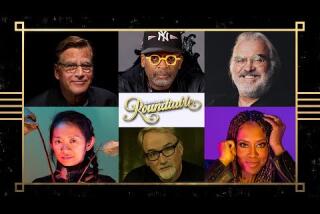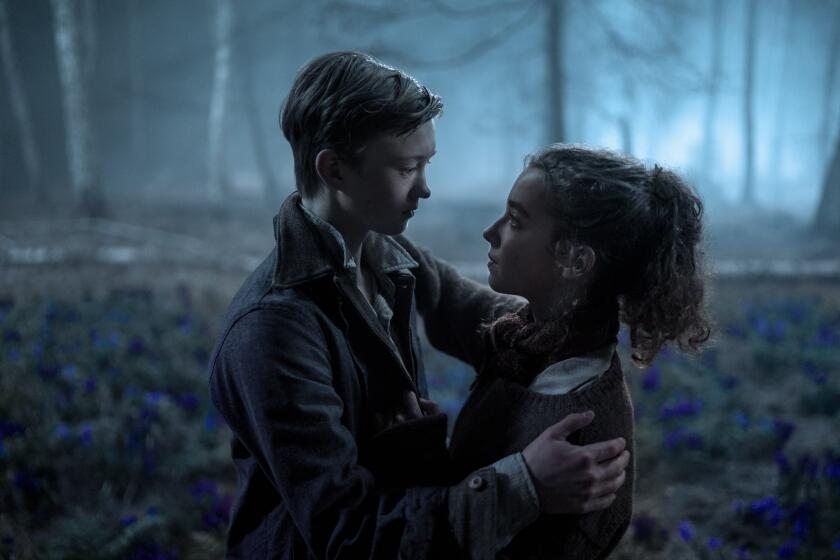MOVIE REVIEW : Remake of ‘Lord of the Flies’ Updates, Trivializes Material
As flies to wanton boys, are we to the Gods; they kill us for their sport. --William Shakespeare
Few modern novels have the sting of Nobel Prize winner William Golding’s “Lord of the Flies.” This fable of civilization battling primitivism on an island of castaway boys has ruthless force, an icy lyricism, cut-glass clarity.
It’s also ideal movie material, and Peter Brook’s fine 1963 film tapped only part of its potential. But the new “Lord of the Flies” (citywide) gets almost none. Remade more than 25 years later by the same producer, Lewis Allen, this version not only doesn’t surpass or match Brook’s, it makes the material look bad. Trying to universalize a story that had universality to spare, director Harry Hook and writer “Sara Schiff”--a pseudonym for Jay Presson Allen, who removed her name from the film--make it overly explicit and trivialize it.
The movie has the appearance of high culture--a glassy, dazed sheen in the cinematography, a drugged, over-deliberate quality in Hook’s framing and groupings. But there’s little going on below the surface. No primordial depths, no dark overweening passions. What’s happening on top is a silly symphony of blatant messages and what often seem to be faceless boy models. The dialogue is riddled with vacuous modernisms: “Give me a break,” the “F” word and references to Rambo and Alf. Give us a break.
The film makers mistake topicality for expressive power. Golding’s story has place and particularity. But it’s also a moral fable, an attack on the erosion of civilization by the psyche’s brutal undercurrents. His castaways, British schoolboys ranging in age from 6 to 12, include coolly athletic Ralph, who symbolizes leadership; Jack, a head choir boy who symbolizes incipient fascism and savagery; and Piggy, a chubby intellectual afflicted with “specs” and asthma. Gradually, Jack, who converts the choir into hunters, unites the island’s population under his tribal domain and sets them against Ralph, hunting him down like a wild beast.
In 1963, Brook made few changes and took his dialogue directly from the novel--with the exception of some brilliant improvisations by his Piggy, Hugh Edwards. But Hook and Schiff make plenty of changes, keep trying to fix the unbroken watch. The story has been updated to post-1990. The boys and dialogue have been Americanized, idiosyncrasy and personality leached out. An adult character--the pilot, present in Golding’s novel only as a corpse--is here at the start, raving incoherently; he has the best of the new dialogue. Gone is the boy’s choir. The characters are now military school cadets, which destroys the symbolic distinctions among Ralph, Jack and Piggy.
Piggy, the rationalist who appears a dunce to the others, has been turned into a real dunce: he makes a paranoid speech about Soviet subs. Nobody’s hair grows much; nobody gets very tanned, sweaty or dirty. Philippe Sarde’s score leans heavily on Stravinsky’s “Rite of Spring.” Balthazar Getty, 15, plays Ralph like a tough, self-confident teen-ager, a bizarre interpretation. Virtually all the actors are amateurs. If they aren’t amateurs, they should be.
And, if the script is a hodgepodge of unconvincing kid argot and slams at “Rambo,” Hook’s direction saps “Flies” further. It has no rhythm or vitality, no sense of danger. Hook completely misses the story’s hypnotic blend of the concrete and the mystical.
Brook’s “Flies,” beautifully acted, missed something too: the rapturous island-adventure side of the book. But here, the lush cinematography, by Martin Fuhrer, conveys little sense of bugs, rot, tropical splendor and decay. The flies buzzing around the impaled pig’s head, their lord, have no reek or threat. This “Lord of the Flies” is like a patriotic pageant, with Ralph delivering the class address on social responsibility.
Does the movie fail completely? Not quite; the central idea shines through everything. But it’s almost as if the island’s struggle was waged over the film itself--and Jack’s group won. Perhaps the film makers subconsciously realize this. Why have they called their production Company “Jack’s Camp/Signal Hill Ltd.”?
Every change in “Lord of the Flies” (rated R for language and violence) was probably made for commercial considerations. Every change was probably justified as a way to bring “important material” to a wider audience. But it can’t work; in Golding’s story, the specific and the symbolic are too inextricably linked. It’s as if someone wanted to bring the anti-war message of “King Lear” to a huge modern audience and decided to reset the play in the Napa Valley, with “King Larry” wailing to his sidekick, The Weirdo, “Hey, we’re like flies, guy! They’re killing us.”
‘LORD OF THE FLIES’
A Columbia Pictures release of a Jack’s Camp/Signal Hill Ltd. production, presented by Castle Rock Entertainment/Nelson Entertainment. Producer Ross Milloy. Director/editor Harry Hook. Script Sara Schiff. Co-producer David V. Lester. Executive producers Lewis Allen, Peter Newman. Camera Martin Fuhrer. Music Philippe Sarde. Supervising editor Tom Priestley. Production design Jamie Leonard. With Balthazar Getty, Chris Furth, Danuel Pipoly, Badgett Dale, Michael Greene.
Running time: 1 hour, 30 minutes.
MPAA rating: R (under 17 requires an accompanying parent or adult guardian).
More to Read
Only good movies
Get the Indie Focus newsletter, Mark Olsen's weekly guide to the world of cinema.
You may occasionally receive promotional content from the Los Angeles Times.










